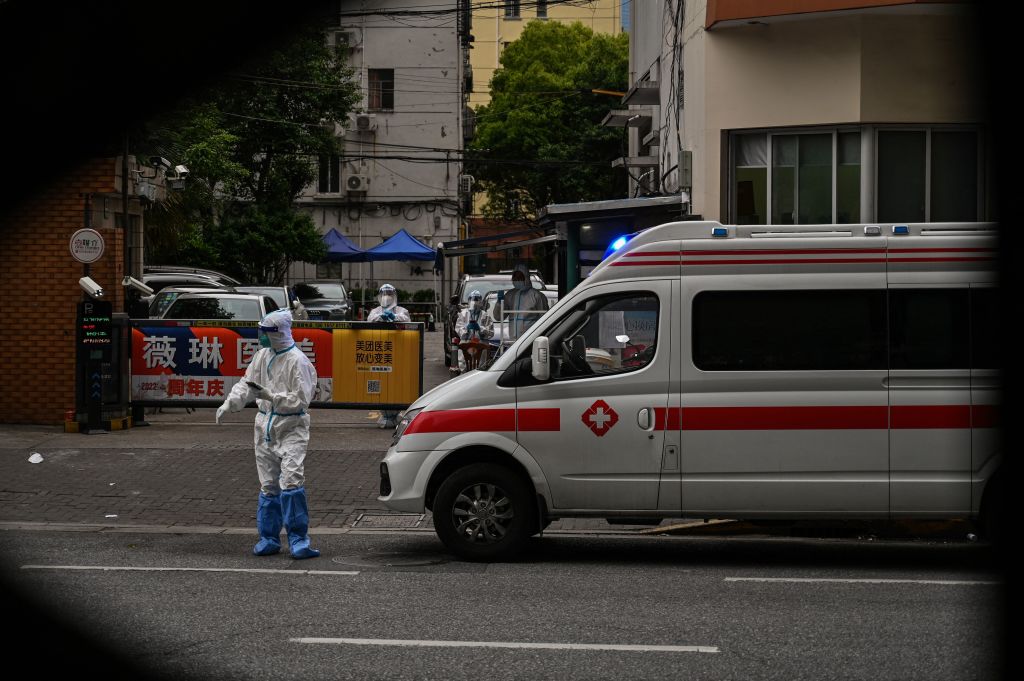
Shanghai’s measures to stem community spread of Covid will remain in place, even as infections drop and the city reported no new cases outside quarantined areas on Friday for the first time since the recent outbreak started.
The financial hub’s fight against the outbreak “remains in a crucial stage,” as the situation is still “severe and complex,” Zhao Dandan, deputy head of the local health commission, told a briefing Saturday, without addressing the significance of the new numbers.
The city of 25 million reported 10,181 new infections April 29, down from 15,032 the previous day. All were either found in lockdown or were reclassified from previously known asymptomatic cases, according to a statement Saturday.
China’s economic activity contracted sharply in April as the lockdown of Shanghai and other areas around the country to contain the spread of Covid-19 closed factories, snarled roads and stopped people from consuming, escalating concerns about further disruption to global supply chains.
The slump was widespread in April, with factory output contracting further and services demand much weaker than forecast. The purchasing managers indexes are the first official April data and show the extent of the damage to the economy due to the outbreak and the government’s Covid Zero policies.
While Shanghai makes progress toward halting community spread, a crucial milestone in its disruptive containment effort to bring the city’s worst outbreak under control, Beijing is tightening measures as the capital seeks to prevent its flareup from growing.
From May 5, people in Beijing will be required to show negative Covid test results taken within the last seven days to enter public venues or to use the transit system. Beijing shut down cinemas during the five-day Labor Day holiday that starts Saturday, the Beijing Daily reported earlier.
The local health commission announced a rollout of “normalized” mass tests to all 22 million citizens after the holiday, according to its Saturday press conference. It requires swabs to be done at least once in a week after the first round of three tests completed on Friday filtered 295 infections. An outbreak involving schoolchildren a week ago put several communities under lockdown, unprecedented in China’s political center.
Beijing will also suspend dining-in at restaurants during the holidays, and said it will increase efforts to ensure food delivery. It added 4,000 hospital beds for Covid infections, and is working on building more shelter hospitals to ease medical care strains.
Chinese officials are now more focused on curtailing the spread of the virus within communities rather than seeking to reduce the caseload to absolute zero as the highly infectious omicron variant poses unprecedented challenges to the Covid Zero strategy.
The nationwide tally of new confirmed Covid cases also eased to 1,424 Friday, from 5,659 the previous day, according to the health ministry.
Shanghai citizens shouldn’t relax efforts to stem the community spread of the virus, and elderly residents should get vaccinated as soon as possible, Zhao said. The city reported 47 deaths of infected patients on Friday. They had an average age of 82.4, all died from underlying diseases and only three were vaccinated.
The city will keep pushing for more businesses to resume services, after companies in the first batch, including Tesla Inc., were already allowed to do so, an official told the briefing.
–With assistance from Dong Lyu.
More Must-Reads From TIME
- The 100 Most Influential People of 2024
- The Revolution of Yulia Navalnaya
- 6 Compliments That Land Every Time
- What's the Deal With the Bitcoin Halving?
- If You're Dating Right Now , You're Brave: Column
- The AI That Could Heal a Divided Internet
- Fallout Is a Brilliant Model for the Future of Video Game Adaptations
- Want Weekly Recs on What to Watch, Read, and More? Sign Up for Worth Your Time
Contact us at letters@time.com